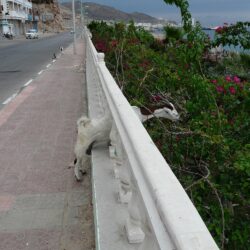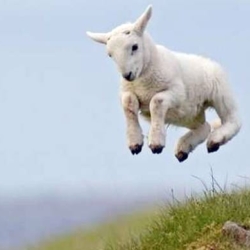Ḥad Gadya has a place in Seder tables throughout the Jewish world, and in many communities it was read in translation. Probably not this one though, seeing as it was written more than five hundred years after the Tocharian language family went extinct. But maybe, in an alternate timeline, some of the Radhanites who traded along the Silk Road in the heyday of the Tocharians ended up settling in the Tarim Basin (in present-day Xinjiang/East Turkestan), and in this timeline where Tocharian survived the Jews of that region might sing something like this at their sedarim. The following is a Tocharian B translation and Hebrew-script transcription of Ḥad Gadya. Unicode does not currently have Tocharian-script coverage, but in the event that it is ever introduced I’ll type it up!
(Thank you to Prof. Michael Weiss for his extensive help with this translation!)
| Source (Aramaic) | Translation (Tocharian B, romanized) | Translation (Tocharian B, hebraicized) | Translation (English) |
|---|---|---|---|
חַד גַּדְיָא, חַד גַּדְיָא. דְּזַבִּן אַבָּא בִּתְרֵי זוּזֵי, חַד גַּדְיָא, חַד גַּדְיָא. |
śaro ṣe śaro ṣe kᵤce ñy āppo käryāte kᵤśānenesa śaro ṣe, śaro ṣe |
שַרוֹ שֵﬞי, שַרוֹ שֵﬞי קְוְטְשֵי נִﬞיאָפּוֹ קֶרְיָאטֵי קְוְשָאנֵינֵיסַה שַרוֹ שֵﬞי, שַרוֹ שֵﬞי׃ |
One little goat, one little goat that my father bought for two zuzim. One little goat, one little goat. |
וְאָתָא שֻׁנְרָא וְאָכְלָה לְגַדְיָא, דְּזַבִּן אַבָּא בִּתְרֵי זוּזֵי, חַד גַּדְיָא, חַד גַּדְיָא. |
śem entwe mārjāre ṣp śāwa śroñ kᵤce ñy āppo käryāte kᵤśānenesa śaro ṣe, śaro ṣe |
שֵים אֵינְטְוֵי מָארְגָﬞארֵי שְﬞפֶשָאוַה שרוֹןﬞ קְוְטְשֵי נִﬞיאָפּוֹ קֶרְיָאטֵי קְוְשָאנֵינֵיסַה שַרוֹ שֵﬞי, שַרוֹ שֵﬞי׃ |
A cat came and ate the goat that my father bought for two zuzim. One little goat, one little goat. |
וְאָתָא כַּלְבָּא וְנָשַׁךְ לְשֻׁנְרָא, דְּאָכְלָה לְגַדְיָא, דְּזַבִּן אַבָּא בִּתְרֵי זוּזֵי, חַד גַּדְיָא, חַד גַּדְיָא. |
śem entwe ku ṣp tsāka mārjāre kᵤce śāwa śroñ kᵤce ñy āppo käryāte kᵤśānenesa śaro ṣe, śaro ṣe |
שֵים אֵינְטְוֵי קוּ שְﬞפֶצָאקַה מָארְגָﬞארֵי קְוְטְשֵי שָאוַה שרוֹןﬞ קְוְטְשֵי נִﬞיאָפּוֹ קֶרְיָאטֵי קְוְשָאנֵינֵיסַה שַרוֹ שֵﬞי, שַרוֹ שֵﬞי |
A dog came and bit the cat that ate the goat that my father bought for two zuzim. One little goat, one little goat. |
וְאָתָא חֻטְרָא וְהִכָּה לְכַלְבָּא, דְּנָשַׁךְ לְשֻׁנְרָא, דְּאָכְלָה לְגַדְיָא, דְּזַבִּן אַבָּא בִּתְרֵי זוּזֵי, חַד גַּדְיָא, חַד גַּדְיָא. |
śem entwe or ṣp pyāksa koṃ kᵤce tsāka mārjāre kᵤce śāwa śroñ kᵤce ñy āppo käryāte kᵤśānenesa śaro ṣe, śaro ṣe |
שֵים אֵינְטְוֵי אוֹר שְﬞפֶפְיָאקסַה קוֹן קְוְטְשֵי צָאקַה מָארְגָﬞארֵי קְוְטְשֵי שָאוַה שרוֹןﬞ קְוְטְשֵי נִﬞיאָפּוֹ קֶרְיָאטֵי קְוְשָאנֵינֵיסַה שַרוֹ שֵﬞי, שַרוֹ שֵﬞי׃ |
A stick came and hit the dog that bit the cat that ate the goat that my father bought for two zuzim. One little goat, one little goat. |
וְאָתָא נוּרָא וְשָׂרַף לְחֻטְרָא, דְּהִכָּה לְכַלְבָּא, דְּנָשַׁךְ לְשֻׁנְרָא, דְּאָכְלָה לְגַדְיָא, דְּזַבִּן אַבָּא בִּתְרֵי זוּזֵי, חַד גַּדְיָא, חַד גַּדְיָא. |
śem entwe por ṣp pelykwa or kᵤce pyāksa koṃ kᵤce tsāka mārjāre kᵤce śāwa śroñ kᵤce ñy āppo käryāte kᵤśānenesa śaro ṣe, śaro ṣe |
שֵים אֵינְטְוֵי פוֹר שְﬞפֶפֵילְﬞקְוַה אוֹר קְוְטְשֵי פְיָאקְסַה קוֹן קְוְטְשֵי צָאקַה מָארְגָﬞארֵי קְוְטְשֵי שָאוַה שרוֹןﬞ קְוְטְשֵי נִﬞיאָפּוֹ קֶרְיָאטֵי קְוְשָאנֵינֵיסַה שַרוֹ שֵﬞי, שַרוֹ שֵﬞי׃ |
A fire came and burned the stick that hit the dog that bit the cat that ate the goat that my father bought for two zuzim. One little goat, one little goat. |
וְאָתָא מַיָּא וְכָבָה לְנוּרָא, דְּשָׂרַף לְחֻטְרָא, דְּהִכָּה לְכַלְבָּא, דְּנָשַׁךְ לְשֻׁנְרָא, דְּאָכְלָה לְגַדְיָא, דְּזַבִּן אַבָּא בִּתְרֵי זוּזֵי, חַד גַּדְיָא, חַד גַּדְיָא. |
śem entwe āp ṣp kessa por kᵤce pelykwa or kᵤce pyāksa koṃ kᵤce tsāka mārjāre kᵤce śāwa śroñ kᵤce ñy āppo käryāte kᵤśānenesa śaro ṣe, śaro ṣe |
שֵים אֵינְטְוֵי אָפ שְﬞפֶקֵיסַּה פוֹר קְוְטְשֵי פֵילְﬞקְוַה אוֹר קְוְטְשֵי פְיָאקְסַה קוֹן קְוְטְשֵי צָאקַה מָארְגָﬞארֵי קְוְטְשֵי שָאוַה שרוֹןﬞ קְוְטְשֵי נִﬞיאָפּוֹ קֶרְיָאטֵי קְוְשָאנֵינֵיסַה שַרוֹ שֵﬞי, שַרוֹ שֵﬞי׃ |
Water came and put out the fire that burned the stick that hit the dog that bit the cat that ate the goat that my father bought for two zuzim. One little goat, one little goat. |
וְאָתָא תּוֹרָא וְשָׁתָא לְמַיָּא, דְּכָבָה לְנוּרָא, דְּשָׂרַף לְחֻטְרָא, דְּהִכָּה לְכַלְבָּא, דְּנָשַׁךְ לְשֻׁנְרָא, דְּאָכְלָה לְגַדְיָא, דְּזַבִּן אַבָּא בִּתְרֵי זוּזֵי, חַד גַּדְיָא, חַד גַּדְיָא. |
śem entwe kauᵤrṣe ṣp yāś āp kᵤce kessa por kᵤce pelykwa or kᵤce pyāksa koṃ kᵤce tsāka mārjāre kᵤce śāwa śroñ kᵤce ñy āppo käryāte kᵤśānenesa śaro ṣe, śaro ṣe |
שֵים אֵינְטְוֵי קַוּוְרְשֵﬞי שְﬞפֶיָאש אָפ קְוְטְשֵי קֵיסַּה פוֹר קְוְטְשֵי פֵילְﬞקְוַה אוֹר קְוְטְשֵי פְיָאקְסַה קוֹן קְוְטְשֵי צָאקַה מָארְגָﬞארֵי קְוְטְשֵי שָאוַה שרוֹןﬞ קְוְטְשֵי נִﬞיאָפּוֹ קֶרְיָאטֵי קְוְשָאנֵינֵיסַה שַרוֹ שֵﬞי, שַרוֹ שֵﬞי |
An ox came and drank the water that put out the fire that burned the stick that hit the dog that bit the cat that ate the goat that my father bought for two zuzim. One little goat, one little goat. |
וְאָתָא הַשּׁוֹחֵט וְשָׁחַט לְתוֹרָא, דְּשָׁתָא לְמַיָּא, דְּכָבָה לְנוּרָא, דְּשָׂרַף לְחֻטְרָא, דְּהִכָּה לְכַלְבָּא, דְּנָשַׁךְ לְשֻׁנְרָא, דְּאָכְלָה לְגַדְיָא, דְּזַבִּן אַבָּא בִּתְרֵי זוּזֵי, חַד גַּדְיָא, חַד גַּדְיָא. |
śem entwe kauṣenta lwasāṃts[1] Literally: “killer of animals.” An alternate term could be käryorttau misāṃts, “merchant of meats.” Depends on your interpretation of the position of the shoḥet in the narrative! ṣp kausa kauᵤrṣ kᵤce yāś āp kᵤce kessa por kᵤce pelykwa or kᵤce pyāksa koṃ kᵤce tsāka mārjāre kᵤce śāwa śroñ kᵤce ñy āppo käryāte kᵤśānenesa śaro ṣe, śaro ṣe |
שֵים אֵינְטְוֵי קַוּשֵﬞינְטַה־לְוַסָאנְץ שְﬞפֶקַוּסַה קַוּוְרְשﬞ קְוְטְשֵי יָאש אָפ קְוְטְשֵי קֵיסַּה פוֹר קְוְטְשֵי פֵילְﬞקְוַה אוֹר קְוְטְשֵי פְיָאקְסַה קוֹן קְוְטְשֵי צָאקַה מָארְגָﬞארֵי קְוְטְשֵי שָאוַה שרוֹןﬞ קְוְטְשֵי נִﬞיאָפּוֹ קֶרְיָאטֵי קְוְשָאנֵינֵיסַה שַרוֹ שֵﬞי, שַרוֹ שֵﬞי׃ |
A butcher came and slaughtered the ox that drank the water that put out the fire that burned the stick that hit the dog that bit the cat that ate the goat that my father bought for two zuzim. One little goat, one little goat. |
וְאָתָא מַלְאַךְ־הַמָּ֫וֶת וְשָׁחַט לְשׁוֹחֵט, דְּשָׁחַט לְתוֹרָא, דְּשָׁתָא לְמַיָּא, דְּכָבָה לְנוּרָא, דְּשָׂרַף לְחֻטְרָא, דְּהִכָּה לְכַלְבָּא, דְּנָשַׁךְ לְשֻׁנְרָא, דְּאָכְלָה לְגַדְיָא, דְּזַבִּן אַבָּא בִּתְרֵי זוּזֵי, חַד גַּדְיָא, חַד גַּדְיָא. |
śem entwe mār ṣp kausa kauṣentai lwasāṃts kᵤce kausa kauᵤrṣ kᵤce yāś āp kᵤce kessa por kᵤce pelykwa or kᵤce pyāksa koṃ kᵤce tsāka mārjāre kᵤce śāwa śroñ kᵤce ñy āppo käryāte kᵤśānenesa śaro ṣe, śaro ṣe |
שֵים אֵינְטְוֵי מָאר שְﬞפֶקַוּסַה קַוּשֵﬞינְטַי־לְוַסָאנְץ קְוְטְשֵי קַוּסַה קַוּוְרְשﬞ קְוְטְשֵי יָאש אָפ קְוְטְשֵי קֵיסַּה פוֹר קְוְטְשֵי פֵילְﬞקְוַה אוֹר קְוְטְשֵי פְיָאקְסַה קוֹן קְוְטְשֵי צָאקַה מָארְגָﬞארֵי קְוְטְשֵי שָאוַה שרוֹןﬞ קְוְטְשֵי נִﬞיאָפּוֹ קֶרְיָאטֵי קְוְשָאנֵינֵיסַה שַרוֹ שֵﬞי, שַרוֹ שֵﬞי׃ |
The Angel of Death came and slaughtered the shoḥet who slaughtered the ox that drank the water that put out the fire that burned the stick that hit the dog that bit the cat that ate the goat that my father bought for two zuzim. One little goat, one little goat. |
וְאָתָא הַקָּדוֹשׁ־בָּרוּךְ־הוּא וְשָׁחַט לְמַלְאַךְ־הַמָּ֫וֶת דְּשָׁחַט לְשׁוֹחֵט, דְּשָׁחַט לְתוֹרָא, דְּשָׁתָא לְמַיָּא, דְּכָבָה לְנוּרָא, דְּשָׂרַף לְחֻטְרָא, דְּהִכָּה לְכַלְבָּא, דְּנָשַׁךְ לְשֻׁנְרָא, דְּאָכְלָה לְגַדְיָא, דְּזַבִּן אַבָּא בִּתְרֵי זוּזֵי, חַד גַּדְיָא, חַד גַּדְיָא. |
śem entwe sākre mahābram-ñäkte ṣp kausa maraṃ kᵤce kausa kauṣentai lwasāṃts kᵤce kausa kauᵤrṣ kᵤce yāś āp kᵤce kessa por kᵤce pelykwa or kᵤce pyāksa koṃ kᵤce tsāka mārjāre kᵤce śāwa śroñ kᵤce ñy āppo käryāte kᵤśānenesa śaro ṣe, śaro ṣe |
שֵים אֵינְטְוֵי סָאקרֵי מַהָאבְרַם־נֶﬞקְטֵי שְﬞפֶקַוּסַה מַרַן קְוְטְשֵי קַוּסַה קַוּשֵﬞינְטַי־לְוַסָאנְץ קְוְטְשֵי קַוּסַה קַוּוְרְשﬞ קְוְטְשֵי יָאש אָפ קְוְטְשֵי קֵיסַּה פוֹר קְוְטְשֵי פֵילְﬞקְוַה אוֹר קְוְטְשֵי פְיָאקְסַה קוֹן קְוְטְשֵי צָאקַה מָארְגָﬞארֵי קְוְטְשֵי שָאוַה שרוֹןﬞ קְוְטְשֵי נִﬞיאָפּוֹ קֶרְיָאטֵי קְוְשָאנֵינֵיסַה שַרוֹ שֵﬞי, שַרוֹ שֵﬞי׃ |
Then the blessed Holy One came and slaughtered the Angel of Death who slaughtered the shoḥet who slaughtered the ox that drank the water that put out the fire that burned the stick that hit the dog that bit the cat that ate the goat that my father bought for two zuzim. One little goat, one little goat. |
This is the translation of Ḥad Gadya into Tocharian B by Isaac Gantwerk Mayer.
The earliest known appearance of “Ḥad Gadya,” by an unknown author, can be found, handwritten, in the Prague Haggadah (1526). The Aramaic has been vocalized according to the Prague Haggadah (1590). Besides the transcription of the Aramaic with its vocalization, I have also added an English translation adapted from Eve Levavi Feinstein’s Passover Haggadah translation. –Aharon N. Varady
Notes
| 1 | Literally: “killer of animals.” An alternate term could be käryorttau misāṃts, “merchant of meats.” Depends on your interpretation of the position of the shoḥet in the narrative! |
|---|

“חַד גַּדְיָא | Śaro Ṣe — a Tocharian B translation of Ḥad Gadya derived from an alternate timeline by Isaac Gantwerk Mayer” is shared through the Open Siddur Project with a Creative Commons Attribution-ShareAlike 4.0 International copyleft license.










Leave a Reply